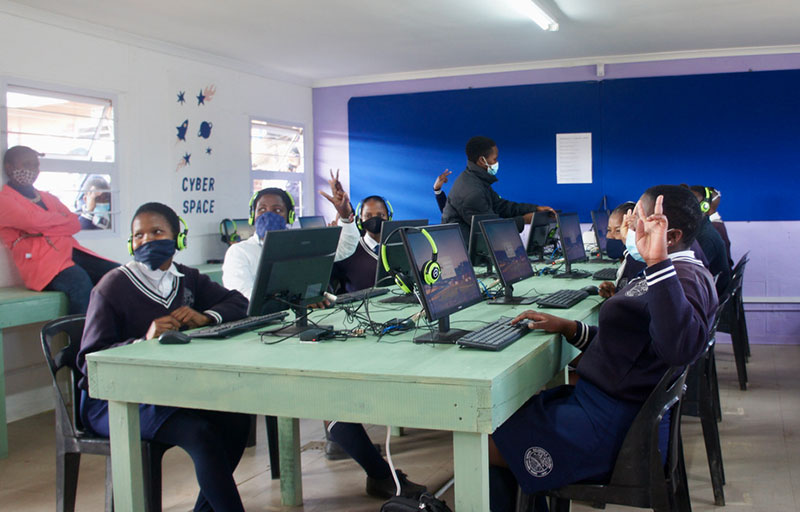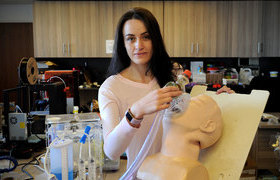UCT grads build scaleable, low-cost tech centre for EC learners
10 September 2021 | Story Zak Essa, Ryan Anderson, Claude Formanek, Nicolas Reid, Callum Tilbury, Jonathan Hart. Read time 9 min.
Five University of Cape Town (UCT) graduates have given learners in five rural Eastern Cape villages a technological leg up by building a scaleable, low-cost tech centre using Raspberry Pi computers and free open-source software.
The Bulungula Tech Centre, a 16-computer-station hub based at Nqileni village, was developed in partnership with The Delta, as a pilot project for rural schools. The developers, Zak Essa, Ryan Anderson, Claude Formanek, Nicolas Reid, Callum Tilbury and Jonathan Hart, have also created a free knowledge repository and step-by-step guidelines for anyone keen to do something similar.
This is what they wrote about the project.
In 2005, a United Nations-backed initiative aimed to change the world through technology. By endeavouring to create a R1 500 computer for developing countries with limited electricity and internet access, One Laptop per Child (OLPC) set out to bring world-class education to the world’s poorest areas. The project was a spectacular failure. The laptop cost more than R3 000, the software was buggy, and the clunky machine often broke down – with little technical support available to fix it. Today, the OLPC remains a key case study for why technology alone is not adequate to solve difficult development challenges.
Tech injection
Despite this, OLPC’s vision was not necessarily wrong. The deep rural Eastern Cape, where the Bulungula Incubator is based, faces some of the most acute development challenges in South Africa. Access to the villages around Bulungula is via treacherous dirt roads. There is no electricity, and infrastructure is limited.
“Youth unemployment is above 90%, and barely 5% of adults finish high school.”
The Mbhashe municipality is also one of the poorest in South Africa, according to the latest census results. Educational and employment outcomes in the region amplify the consequences of poor service delivery. Youth unemployment is above 90%, and barely 5% of adults have finished high school. It is unlikely that the youth in the villages surrounding Bulungula will have access to the same educational facilities, teachers, resources or tools that urban areas have any time soon.

With this in mind, one of the programmes run at the Bulungula Incubator is a Job Skills and Entrepreneurship Programme. The programme is aimed at unemployed youth and equips them with the skills needed to secure employment. But the biggest constraint is that the material and courses delivered are limited to the skills available from an external facilitator, who would have to travel to Bulungula – a long, costly journey.
“Technology has the potential to bring a world of knowledge and opportunities to the youth at a fraction of the cost.”
But what if this was no longer a limitation? What if the youth could learn about data capturing, data science or social entrepreneurship from industry professionals? Imagine if they could watch YouTube videos about the latest permaculture techniques, or learn how to build furniture for homes in the area? Imagine if they could apply for National Student Financial Aid Scheme (NSFAS) funding, and access universities, universities of technology, or online diplomas, without having to travel hours to the nearest city?
With the failures of OLPC at the back of our minds, the aim was to build a low-cost, sustainable tech centre in Bulungula.
A question of technology
When setting out on this mission, there were myriad factors to consider. Without electricity, how would we run the centre? Should we use PCs, laptops or tablets? How do we work around high data costs? What software is most appropriate? How do we maintain and troubleshoot the centre, with very few people in the community ever having used a computer before? How do we ensure that the technology does not go into a dusty cupboard once we leave?
Given the electricity and budget constraints, the choice of devices was key. We looked at using PCs, laptops, tablets and more. In the end, we chose the Raspberry Pi computer. It ticked all the boxes: it’s energy-efficient, and at R1 000 a unit, much cheaper than a PC – but with enough memory and computational power to ensure a complete desktop experience.
Open-source ware to the fore
Once we had settled on using Raspberry Pi computers, we had to determine how they would be configured and connected to enable the networking functionality expected from a computer lab (user log-ins, personal files, etc). This is where the open-source community around the Raspberry Pi came to the fore.
The Raspberry Pi Foundation has developed and supports a tool called PiServer, which converted our networking problem into a ‘plug and play’ exercise. We simply had to instal the software onto a central PC and connect the Raspberry Pi computers on a local network. The Raspberry Pi desktop interface is based on Linux and is very intuitive to use – a key consideration for a community where most residents had never used a computer before.
Due to the exorbitant price of data in South Africa, we had to consider how learning material would be shared among the students without burdening the centre with the cost of downloading these materials from the internet. Once again, open-source software was the solution. We opted for Kolibri, a free offline digital-learning platform developed by the Learning Equality Foundation.
“A final consideration was how to ensure the sustainability of the lab after we leave.”
To reduce our reliance on high-speed internet, we load learning material onto a flash drive and physically transport it to the learning centre. Kolibri makes it easy to upload learning material from a flash drive to the tech centre. Once the learning material is on the central PC, the students can easily access it from any of the connected Raspberry Pi computers. Kolibri also makes it possible for teachers to set up digital quizzes, giving the students a fully fledged digital learning experience.
A final consideration was how to ensure the sustainability of the lab after we leave. To mitigate this potential issue, we started by developing a guide for the centre. This outlines how to set up the centre from scratch, how to facilitate its day-to-day operations, and how to troubleshoot issues. To accompany the guide, we employed and trained (using the guide) two passionate young individuals from the community as part-time employees to run the centre. As there are software-related issues that are beyond the scope of the guide and the expertise of the centre administrators, we enabled the ability to access the central PC remotely, allowing us to assist with the software side of the centre from wherever we are.
Where to next?
As learners entered the Bulungula Tech Centre for the first time, the excitement was palpable. It was the first time most had used a computer. Once the learners were orientated, the fun began. In the two months since, the Bulungula Tech Centre has been used to help matric learners apply to universities and universities of technology. It has been used by youth in the Job Skills and Entrepreneurship Programme to complete financial literacy courses. Grade 10, 11 and 12 learners have been using Khan Academy, YouTube and other online resources to supplement their learning in class. And over 120 people have become familiar with the PCs and are on their way to becoming computer literate.
There is still a long way to go, and there will almost certainly be kinks to iron out. In the months to come, it is envisioned that the centre will partner with different organisations to deliver targeted content, and that coding classes will be offered to young learners during school holidays, as well as CV-building workshops for the community.
At the end of the day, technology is not going to be a silver bullet for addressing the difficult development challenges that rural areas face. Alone, it will not revolutionise rural South Africa and lift its residents out of poverty. But technology has come a long way in recent years; with new open-source software, cheaper hardware, and a tonne of free content online, it is easier to get information into people’s hands.
Combining this with appropriate facilitation, content and partnerships, technology can help create new opportunities for rural communities.
 This work is licensed under a Creative Commons Attribution-NoDerivatives 4.0 International License.
This work is licensed under a Creative Commons Attribution-NoDerivatives 4.0 International License.
Please view the republishing articles page for more information.










